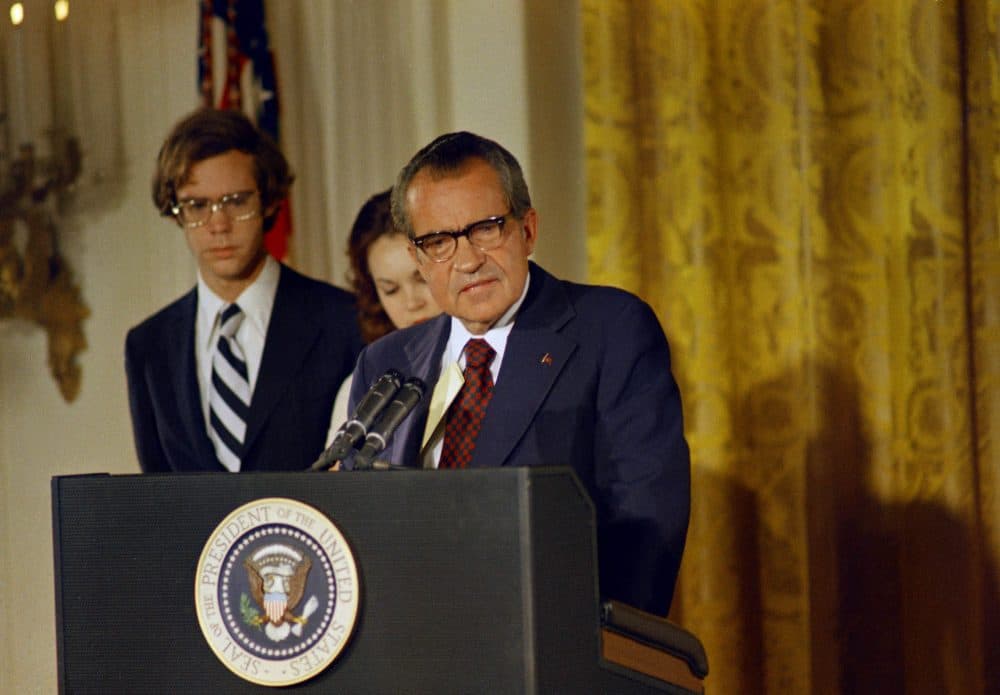Advertisement
Podcast Preview: Was The Comey Firing Nixonian?
Resume
The WBUR iLab is releasing the second episode of a politics and history podcast in development. This week, Pulitzer Prize-winning author and journalist Ron Suskind and Boston College historian Heather Cox Richardson talk with journalist and historian Rick Perlstein. They compare and contrast President Trump's firing of FBI Director James Comey and President Nixon's infamous "Saturday Night Massacre."

The working title for the podcast is "Unsettled: The Trump Years." Take a listen and tell us what you think in the comment section.
Excerpts
On Nixon’s Saturday Night Massacre:
Rick Perlstein: There were investigations [into Nixon and the Watergate break-in] on all sorts of tracks. There was a Senate investigation but there was also an investigation by an independent prosecutor, Archibald Cox. He was developing thousands of pages of reconstruction, evidence, data and interviews. Recently, it had been revealed that Nixon had been taping everything and immediately everyone was trying to get those tapes. President Richard Nixon was refusing and Archibald Cox was pressing, he was subpoenaing and Richard Nixon said these subpoenas don’t apply to him as the president. And as Cox was getting closer and closer to this evidence that Richard Nixon knew would reveal that he had been lying to the American public for months and months and months, Nixon ordered his attorney general, Elliot Richardson, to fire Cox. Now Elliot Richardson, in order to get confirmed as attorney general, had promised the Senate Judiciary Committee that he would not interfere with any independent investigation of Watergate. So being an honorable man, Richardson resigned rather than disavow his pledge to the Senate. So his deputy, a gentleman named William Ruckelshaus, also resigned. Finally they go down the chain and Robert Bork steps up and followed the orders and fires Archibald Cox. And no one could get into this massive office that was investigating Richard Nixon. All the evidence that was collected was basically removed from the public’s access. It was guarded by armed FBI agents. And this looked like a constitutional coup. People began to talk about brown shirts. Bob Packwood, the Republican senator from Oregon, said this is something you’d see in Hitler’s time. Very soon afterwards there were 44 bills of impeachments or bills recommending investigation towards impeachment.
Heather Cox Richardson: The Republicans in Nixon’s era had a number of moderates, who we would call Rockefeller Republicans, who believed in the concept that the government should work for everyone. They didn’t like the way the Democrats did it but they did like the idea of a government that belonged to everyone. On the other hand, the Republicans in Congress today no longer believe in the American government or a government that should work for everyone. They want to destroy the government. And then we have as president a man who has no use at all for any American norms or the American government and has no need for a fig leaf. The very fact that after firing Comey there would be a photo opt with a Russian political official, Sergei Lavrov, the foreign minister, is such an in-your-face move. Will we normalize this the way Paul Ryan and Mitch McConnell have? Will we say, yes it is OK since Comey made a mistake over Clinton's emails, which many people think he did. I think it is a crisis.
On whether the firing of James Comey will be Trump’s downfall as the Saturday Night Massacre was Nixon’s:
Perlstein: It was only checkmate for Nixon because we had two parties that were willing to act like patriots in the 1970s. That’s why we’re on the razor’s edge between something that resembles a government of laws not men and authoritarianism.
Ron Suskind: I think a question I have is whether in this era there is even a recognition, broadly across society, of principle. Do the loyalists to Trump, in Congress and in the wide country, recognize the violation of principle in this instance? I firmly believe the thread is unraveling on the issue of rule of law. Watergate was a break-in and Nixon covered it up. But what you’re talking about here is a different category. Many people call this treason, consorting in the way this campaign did with a foreign power and carrying it all the way through to the administration. And the question now is what happens next? I mean if there is not a reaction and not a follow up investigation, where do we end up then?
The views and opinions expressed in this podcast are solely those of the participants and do not in any way reflect the views of WBUR management or its employees.
